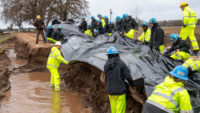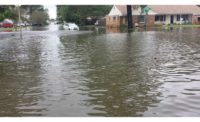Flooding in Virginia Beach, Va., is expected to become an increasing problem during the coming decades, but officials are preparing to undergo a major expansion to the city’s flood protection program aimed at improving its long-term resilience.
Phase 1 of the program includes about 20 projects organized under seven master projects to be completed by 2031, funded largely by a $567.5-million bond referendum. Now, officials are looking to meet with contractors interested in working on the projects. They’re planning to hold a virtual industry day on April 21 to share details about the project opportunities and network with potential participants.
The planned work spans the city from its central resort district and the eastern shore drive to more interior neighborhoods like Windsor Woods and The Lakes. The city plans to install storm sewer pipes, construct tide barriers and flood control gates, raise roads and add drainage improvements, build pump stations and undertake other work.
Virginia Beach sits on the coast at the mouth of the Chesapeake Bay and is dotted with lakes, rivers, bays and marshes. It is the state’s most populous area with nearly 460,000 people as of 2020. As ENR has previously reported, flooding has occurred more frequently and more disruptive as development has continued in the city, prompting officials to commission studies on how to improve its storm water infrastructure capacity and resilience. In 2016, the city faced repeated flooding from the trio of tropical storm Julia and Hurricanes Hermine and Matthew. Phil Pullen, Virginia Beach's city engineer, says that showed how vulnerable the city is to flooding.
"The weather is getting worse," he says. "We have studies showing that the rainfall events are getting more intense, more frequent, and there's just more volume of rain. The other thing is we have a 50-year-old antiquated storm system. So all that together is causing for bad flooding, recurrent flooding."
An Old Dominion University analysis estimates that, if nothing is done to address smaller flood events and sea level rise, average annualized economic losses from recurrent floods in Virginia Beach will rise from $74.7 million now to $349.1 million by the 2060s, plus the city’s economic output will see average losses of $495.5 million each year in the same decade.
Voters agreed to fund the projects in the November 2021 election via a bond referendum. An implementation plan prepared for the city by Jacobs Engineering shows procurement and design for many of the projects starting this year.
L.J. Hansen, Virginia Beach’s public works director, said the upcoming industry day will provide the city with an opportunity to share project details with the construction community up front, address any questions and take feedback.
“This type of collaboration is extremely valuable when developing RFPs and other contract documents to ensure successful execution,” Hansen said in a statement.
Any engineers or contractors interested in bidding for the work can register for the industry day event at vbgov.com/rippleeffect. City staff from public works, purchasing and the city’s small-, women- and minority-owned business office will participate in the event. The city is planning to use different delivery methods, including a mix of design-build and traditional processes, Pullen says. Officials say documentation will be available for participants starting April 18 and will remain online through the end of the month.






Post a comment to this article
Report Abusive Comment